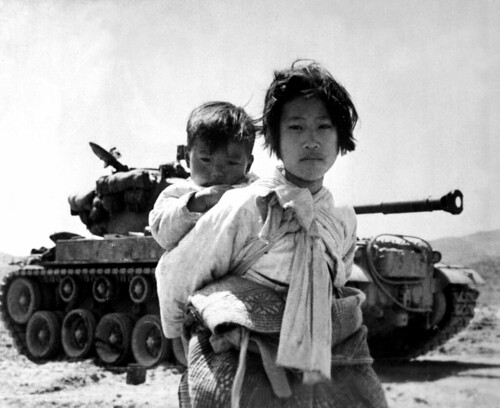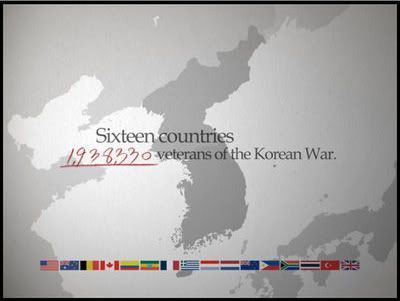The 60th Anniversary of the 6·25 War
Yesterday (25 June) marked the 60th anniversary of the 6·25 War in Korea, more commonly known as the Korean War in English-speaking countries. This is a subject that I had wanted to write about on Thursday night before World Cup Fatigue took its toll, so please excuse the tardiness of this update.

This image always comes to mind when I think of the Korean War. From June 9, 1951. Maj. R.V. Spencer, UAF. (Navy)
Similar to the situation in the United States regarding historical events such as the Civil War, there were a few people here yesterday bemoaning the lack of awareness students now have about this important event in Korean history. One radio program that I caught while taking a taxi yesterday morning featured one woman who was telling her co-host that 70% of schoolchildren today don't know when the Korean War began. This is a topic that was brought up last year as well, and I think it's worth repeating that how a survey question is posed has a very strong influence on the type of responses one will receive. As such, it would be interesting to see how the researchers came up with the figures they did.
Despite the general apathy that these sort of articles highlight I had a class of elementary students bring up the subject of the Korean War in class last year and once again during one of my classes on Friday. However, I will admit that there was likely some outside influence on this year's decision to broach the subject. One of the students reported that soldiers had visited her class the day before to talk about the Korean War with them (based on how she worded this it sounds like they were currently serving in the military and not retired war veterans from the period around the 1950s) while just last week we had spent roughly 35 minutes going over the impact of several twentieth-century conflicts on contemporary international politics*.
I didn't think to ask if soldiers only come to present information to certain grade levels - as sometimes happens with other events - nor whether this is an ongoing annual occurrence or one that has only recently been implemented. This is a dilemma I often have in my intermediate level classes -- finding a balance between the normal coursework and allowing the students to talk about whatever subjects they're interested in, coupled with satisfying my curiosity versus limiting myself to corrections of grammar or pronunciation so the students have the opportunity to express their ideas naturally.
Last year there were flags placed along Cheonggyecheon in Seoul to represent the nations involved in the United Nations coalition to aid South Korea along with a photo memorial at the nearby Gwanghwamun Plaza. A bakery here (Fauchon?) also came out with a series of cakes that commemorated the participating nations. (The flag design cakes were originally something I found through Brian in Jeollanam-do but I can no longer find the relevant entry. Sorry, Brian!) Speaking of Brian's site though, he recently posted about a video display in New York's Times Square thanking veterans of the Korean War, courtesy of Professor Seo Kyeong-duk.

A panel from the video. You can see more panels here. Full credit to Brian for posting about this.
On the subject of memorials, one of the easiest to reach is the War Memorial of Korea, located in Seoul. A nicely representative collection of photos, taken by Edward N. Johnson of the U.S. Army Installation Management Command Korea, can be found on Flickr here. There is also a short write-up about Korea's efforts to commemorate the role of war veterans in this article. However, one very impressive internet find I came across earlier in the week is this page, which lists the monuments dedicated to each of the nations that participated in the war. While it may not include directions, it does provide the address for each and includes a photo to go with the location.
I've seen the Ethiopia Monument in Chuncheon and would like to visit some of the memorials as the time and weather allow. Did you know that Gyeonggi-do has two monuments to soldiers from Thailand who gave their lives fighting for South Korea's independence? That's probably information I would have never found on my own were it not for that website. Taking the time to visit a war monument might be a decent idea if you're looking for things to do in the next few weeks.
Of course, if you don't want to make a long trip outdoors there is also the option of watching movies indoors. Wikipedia has a list of Korean War movies here, while the Korea Times names a couple of older, Korean-made films in an article here (not sure how hard they'll be to get ahold of though). The two Korean movies from the list that will likely best easiest to find are Taegukgi and Welcome to Dongmakgol.** Finally, local theaters will be showing '71 - Into the Fire' based on a true story of 71 high school students who fought a holding action against the North Korea army during the early stages of the war. There are a couple of trailers posted online to YouTube here and here. This is the 'official' trailer that I caught in the theater two weeks ago:
* For anyone keeping track at home: The Austro-Hungarian Empire's ethnic policies of the 1890s-1910s, World War I, the Balfour Declaration, Spanish Civil War, Katyn Forest Massacre, Russo-Finnish & Winter Wars, World War II, Sakhalin & Kuril Islands controversy, and Chechen War. I would be surprised if any of my students remember the information now, but they seemed interested at the time.
** For some reason the Hangul (Korean script) is messing up the font formatting on my entry, so here are the titles to the above movies in English and Korean:
Taegukgi (태극기 휘날리며)
Welcome to Dongmakgol (웰컴투 동막골)
71 - Into the Fire (포화속으로)